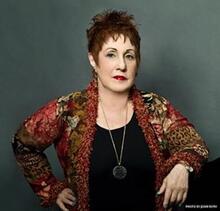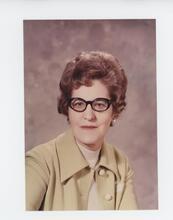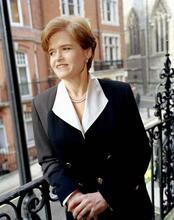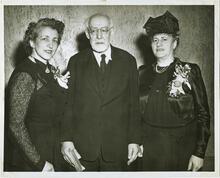Rose Laub Coser
Sociologist Rose Laub Coser redefined major concepts in role theory—the idea that our actions are largely dictated by our roles in society—and applied them to expectations of women’s roles in the family and the workplace. Coser taught sociology before serving as president of the Society for the Study of Social Problems and the Eastern Sociological Society, in addition to cofounding the journal Dissent. Coser expanded role theory and examined women’s roles in the “greedy institution” of the family. Moreover, as an ardent feminist, she initiated a class action lawsuit for the State University of New York’s female faculty and staff to combat wage discrimination. After retiring from the faculty of SUNY Stony Brook, Coser became adjunct faculty at Boston College and distinguished visiting professor at Harvard.
In a life devoted to studying how social structure affects individuals, sociologist Rose Laub Coser made contributions to medical sociology, refined major concepts of role theory, and analyzed contemporary gender issues in the family and in the occupational world.
Early life: education, immigration, marriage
Coaser was born in Berlin, Germany, on May 4, 1916. Her mother, Rachel Lea (Lachowsky) Loeb, was born near Kiev in the Ukraine. Her father, Elias Laub, was born in Poland and immigrated before World War I to Germany, where he became a printer and a publisher. Both parents were ardent socialists close to Rosa Luxemburg. They published Luxemburg’s writings and named their first-born daughter in honor of her. In 1924, the family moved to Antwerp, Belgium, where Rose received a classical and multilingual education, continued to grow in a socialist environment, worked as a printer, and lost a younger sister to an accidental death. To escape the Nazi threat, the Laubs immigrated in 1939 to New York City, where Elias Laub acquired a print shop and occasionally published Yiddish books.
On August 25, 1942, Rose Laub married Lewis A. Coser, a fellow refugee who shared her commitment to socialism and who later became an eminent sociologist. The couple had two children, Ellen Coser Perrin, a professor of pediatrics at the University of Massachusetts Medical School, and Steven Coser, a computer scientist.
Breaking into the sociological field
From 1943 to 1945, Coser studied philosophy at the École Libre des Hautes Études, a Parisian institution relocated during the Nazi years to the New School for Social Research in New York City. After serving as a research assistant to psychoanalyst and experimental child psychologist René Spitz and working for David Riesman on his study of political apathy that became The Lonely Crowd (1950) and Faces in The Crowd (1952), Coser studied at Columbia University with Robert S. Lynd and Robert Merton and completed a Ph.D. in sociology in 1957.
Her career path was not a straight one. She obtained her first full-time academic position at Wellesley College, in Massachusetts, where she remained from 1951 to 1959, advancing from instructor to assistant professor. For the next seven years, she was a research associate in the psychiatry department of the Harvard Medical School, and then became associate professor at Northeastern University. In 1968, both she and her husband obtained professorships in sociology at the State University of New York (SUNY) at Stony Brook. Joint positions for a couple were exceptional at that time, as Coser ironically described in a 1971 article, “On Nepotism and Marginality.” In the course of her distinguished career, she worked both with her husband and independently.
Coser was president of the Society for the Study of Social Problems in 1973 and 1974 and of the Eastern Sociological Society in 1985–1986. She was also vice president of the American Sociological Association. She was one of the founders of the periodical Dissent and sat on the editorial boards of the International Journal of Marriage and the Family and Gender and Society, as well as on other publications.
Contributions to medical sociology
Coser began her career with major contributions to medical sociology. In detailed case studies of mental and medical hospitals, she showed the effects of the bureaucratic organization of medical work on patients and staff. For example, where observability was institutionally structured, professional standards were higher. In expanding Merton’s role theory, Coser emphasized ambiguity and multiplicity. Her study of the professional training of psychiatric residents demonstrated their ambiguous status as both physicians and students. As for multiplicity, Coser argued that a larger repertoire of roles gives the individual greater agency, better opportunities, and wider connections to the outside world. She staunchly defended the liberating potential of a broad modern public world, far beyond the family and the narrow local community. She deplored the traditional restrictions placed on women and their confinement to the “greedy institution” of the family, an institution that demanded their total commitment. In her view, the lack of serious child-care policies enforced women’s low status in society.
In Dissent, Coser expressed her passionate feminism and strongly defended affirmative action and social justice. She also initiated a class-action suit against SUNY, on behalf of female faculty and staff, to redress wage discrimination.
Later life and Jewish influences
After retiring as professor emerita from Stony Brook in 1987, Coser and her husband moved to Cambridge, Massachusetts. There, she became an adjunct professor at Boston College as well as distinguished visiting professor at the Henry Murray Center of Harvard. She died on August 21, 1994, at age eighty-two.
Coser was not religious, but she highly valued her Jewish cultural heritage. Her very first publication was a 1947 review of a book on antisemitism, and at the end of her life, she was working on a comparative study of Jewish and Italian women immigrants at the turn of the century. Her quest for social justice, her defense of modernity, and her sociological contributions owe much to her identity as a woman and a Jew.
Selected works by Rose Laub Coser
Access to Power: Cross-National Studies of Women and Elites, coedited with Cynthia Fuchs Epstein (1981).
“Affirmative Action: Letter to a Worried Colleague,” Dissent 22 (Fall 1975): 207–210.
“Alienation and the Social Structure.” In The Hospital in Modern Society, edited by Eliot Freidson (1963).
“The American Family: Changing Patterns of Social Control.” In Social Control: Views from the Social Sciences, edited by Jack P. Gibbs (1982).
“Anti-Semitism Re-examined,” The New Leader (May 28, 1951): 23.
“Authority and Decision-Making in a Hospital: A Comparative Analysis,” American Sociological Review 23 (February 1958): 56–63.
“Cognitive Structure and the Use of Social Space,” Sociological Forum 1 (Winter 1986): 1–26.
“The Complexity of Roles as a Seedbed of Individual Autonomy.” In The Idea of Social Structure: Papers in Honor of Robert K. Merton (1975).
“Evasiveness as a Response to Structural Ambivalence,” Social Science and Medicine 6 (August 1967): 203–218.
The Family, Its Structure and Its Functions (1964; 2d ed., 1974).
“The Greedy Nature of Gemeinschaft.” In Conflict and Consensus, edited by Walter W. Powell and Richard Robbins (1984).
“A Home Away from Home,” Social Problems 4 (July 1956): 3–17.
“The Housewife and Her Greedy Family,” with Lewis A. Coser. In Greedy Institutions, edited by Lewis Coser (1974).
In Defense of Modernity: Complexity of Social Roles and Individual Autonomy (1991).
“Insulation from Observability and Types of Conformity,” American Sociological Review 26 (February 1961): 28–39.
“Jonestown as Perverse Utopia,” with Lewis A. Coser, Dissent 26 (1979): 158–263.
“Laughter Among Colleagues: A Study of the Social Functions of Humor Among the Staff of a Mental Hospital,” Psychiatry 23 (February 1960): 81–95.
Life Cycle and Achievement in America (1969).
Life in the Ward (1962).
“On Nepotism and Marginality,” American Sociologist 6 (August 1971): 259–260.
“On The Reproduction of Mothering: A Methodological Debate,” with Judith Lorber, Alice S. Rossi, and Nancy Chodorow, Signs 6 (1981): 482–514.
“Pockets of ‘Poverty’ in the Salaries of Academic Women,” with Judith M. Tanur, American Association of University Professors Bulletin 64, no. 1 (1978): 26–30.
“Political Involvement and Interpersonal Relations,” Psychiatry 14 (May 1951): 213–222.
“Portrait of a Bolshevik Feminist,” Dissent 29 (Spring 1982): 235–239.
“The Principle of Patriarchy: The Case of the Magic Flute,” Signs 4 (Winter 1978): 337–348.
“The Principles of Legitimacy and Its Patterned Infringement,” with Lewis A. Coser. In Cross-National Family Research, edited by Mavin B. Sussman and Betty Cogswell (1972)
“Role Distance, Sociological Ambivalence and Transitional Status Systems,” American Journal of Sociology 72 (September 1966): 173–187.
“A Social Disease,” Modern Review 9 (November 1947): 714–719.
“Some Social Functions of Humor,” Human Relations 12 (May 1959): 171–182.
“Stay Home, Little Sheba: On Placement, Displacement and Social Change,” Social Problems 22 (April 1975): 470–480.
“Suicide and the Relational System—A Case Study in a Mental Hospital,” Journal of Health and Social Behavior 17 (December 1976): 318–327.
“Time Perspective and the Social Structure,” with Lewis A. Coser. In Modern Sociology, edited by Alvin M. Gouldner and Helen P. Gouldner (1963).
Training in Ambiguity: Learning Through Doing in a Mental Hospital (1979).
“Where Have All the Women Gone? Like the Sediment of a Good Wine They Have Sunk to the Bottom,” in Access to Power: Cross-National Studies of Women and Elites, edited by Cynthia Fuchs Epstein and Rose Laub Coser (1981).
“Why Bother: Are Research Issues of Women’s Health Worthwhile?” In Women and Their Health: Research Implications for a New Era, edited by Virginia Olesen (1977).
“Women in the Occupational World: Social Disruption and Conflict,” with Gerald Rokoff, Social Problems 18 (1971): 535–554.
“Women’s Liberation: The Real Issues,” Dissent 20 (Spring 1973): 224–230.
Blau, Judith, and Richard Alba. “Empowering Nets of Participation,” Administrative Science Quarterly 27 (1982): 363–379.
Blau, Judith, and Norman Goodman, eds. Social Roles and Social Institutions: Essays in Honor of Rose Laub Coser (1991.
2d ed., 1995).
Boldt, Edward D. “Structural Tightness, Autonomy, and Observability: An Analysis of Hutterite Conformity and Orderliness,” Canadian Journal of Sociology 3 (1978): 349–363.
Deegan, Mary Jo. Women in Sociology (1991).
Coser, Lewis. Personal communications (December 23, 1995.
February 13, 1996).
Epstein, Cynthia Fuchs. “Rose Laub Coser 1916–1994.” Dissent 42 (1995): 107–109, and “Obituary: Rose Laub Coser (1918–1994),” Footnotes 22, 8 (November 1994): 14.
Hughes, Helen MacGill. The Status of Women in Sociology, 1968–1972 (1973).
LaGory, Mark. “Toward a Sociology of Space: The Constrained Choice Model,” Symbolic Interaction 5 (1982): 65–78, and “The Organization of Space and the Character of the Urban Experience,” Publius: The Journal of Federalism 18 (1988): 71–89.
Moen, Phyllis, Robin W. Williams, Jr., and Donna Dempster-McCain. “Social Integration and Longevity: An Event History Analysis of Women’s Roles and Resilience,” American Sociological Review 54 (1989): 635–647.
Stebbins, Robert A. “A Note on the Concept of Role Distance,” American Journal of Sociology 73 (1967): 247–250.
Warren, Donald I. “Power Visibility, and Conformity in Formal Organizations,” American Sociological Review 26 (1968): 951–970.
Wrong, Dennis. “Remembering Rose,” Dissent 42 (1995): 109–110.











